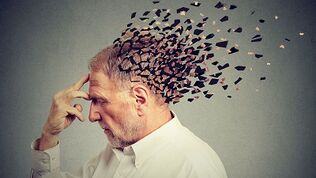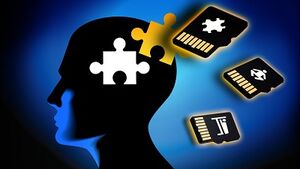
There are conflicting views on memory-enhancing drugs. Some say that it is useful and helps to get rid of intellectual stress, actually helps and is effective.
Others say that this is just a myth, that there is no benefit in taking these drugs, and that they can even be harmful and addictive. Let us take a closer look at both and see who is right.
A little about memory
Memory is a mental function of higher nervous activity that helps to store, store, and reproduce previously received information. Memory allows you to store information about the external world or the body's response to various influences for a long time, as well as to use this information to properly organize future activities.
Memory includes several different but related processes.
- memorization- introduction of new information, sensations.
- Storage- involves the collection, processing and assimilation of information and emotions. This process allows a person to acquire knowledge, develop his thinking and speech.
- Reproduction and recognitionis the actualization of elements, actions, past feelings. Reproduction is involuntary (elements "float" in a person's consciousness without his will and effort) and arbitrariness.
- Forgetis the loss of the ability to reproduce and recognize previously memorized items. This can be temporary or permanent. When information is updated or recognized by mistake or partially, there is complete forgetfulness.
Basic types of memory
There are many types and subtypes of memory classification. Let's talk about its main types.
- Touch Memoryis the ability to store information after it has been sensed.
- Tactile memoryis the storage of information from receptors as a result of touch.
- Motor memoryis the storage of movement information, most of which must remember that they have automatic movements.
- Semantic memoryis the storage of information about facts, such as learned events, dates, multiplication tables.
- Short-term memory- short-term storage of information. It has a small size.
- Long-term memory- unlimited storage of information throughout life.
Memory Laws

Few people know that there are a number of memorization laws. This is not an invention of the author, but a real-life way of life that has been scientifically determined and proven.
- The Law of Repetition- information is better preserved if it is repeated several times.
- Law of Interest- if a person is interested in information, he remembers it faster and better.
- Edge Law- We remember the information at the beginning and end.
- Law of Comprehension- if the information is deeply understood, it will be well remembered.
- The law ofoptimal line lengthis that the amount of information memorized should not exceed the amount of short-term memory.
- Installation Law- A person who gives you an installation to remember this or that information will remember it faster and better.
- Law of Barriers- When you memorize similar concepts, the old information "overlaps" with the new.
- Contextual Law- If you memorize things that are already associated with certain concepts, it will go faster.
- Law of Action- Memorization is effective and fast if memorized in practice.
These laws can also teach you memory if you want to remember something faster and better.
Causes of memory impairment
- Organic brain damageis an acute circulatory disorder of the brain, trauma to the brain, brain tumor.
- Diseases of other organs and systems- diseases of the liver and cardiovascular system.
- external factors- bad environment, drastic changes in living conditions, stress, sleep disorders.
- Age-related changes in the structure of the brain- Decreased inter-neural communication.
- Chronic intoxication- smoking, drug use, drug abuse, alcoholism, drug addiction (sedative, sedative).
Treatment of memory impairment
Medications are not prescribed immediately if you need to improve your memory. At first, they try to use drugs. These include:
- Fresh air walk. This increases the brain's ability to access oxygen. This increases the efficiency of its work.
- normalize sleepand stay awake.
- Evening Training- It may be unusual to remember all the events of the day in reverse order, that is, to remember what happened first in the evening and then in the morning. It is best to do this at bedtime.
- Positive attitude, don't think about it- don't think that your memory is bad, no one has freed himself from hypnosis. If at some point you can't remember something, don't worry, don't get angry, just get distracted, do something else, and then try to remember what you forgot.
- Daily training- solving crossword puzzles, riddles, scanwords.
- Education- learn poetry, foreign languages, do it regularly, gradually increase the material you learn.
Medication for memory loss

It is clear that it is not easy to learn poetry, a foreign language, to solve riddles, to walk and solve puzzles, the worker should be given extra time without working time.
It's much easier to take pills, calm down and hope for the magic of medicine - your memory will improve immediately and you won't do anything! The modern city dweller is so lazy and corrupt from the fruits of civilization that so few people are so purposeful and so few who want to spend their time and energy on cultivating memory. So, a person is looking for an answer to his question - what are the pills that improve memory?
So let's look at two opposing views on this issue:
Positive feedback
Proponents of these drugs claim that a number of drugs help to improve the blood supply to brain cells, which in turn improves their nutrition and provides them with more oxygen, which improves the metabolic processes in neurons.Nootropics and drugs that improve the rheological properties of the blood can help.
Herbal medicines are widely used, which not only improve the metabolic processes in neurons on their own, but also increase the effect of nootropic drugs.
However, it should be borne in mind that any (absolutely desirable) drug has its own contraindications and side effects, so it should be prescribed only by a physician in each specific clinical case.
Negative feedback
According to some experts, there is another downside to the coin. A few years ago, experts wondered - are these drugs effective or just a placebo effect?
Numerous studies have not proven the effectiveness of nootropics. There is no evidence that they have a beneficial effect on memory. One small study on the effectiveness of drugs has shown that they have little effect, but in severe cases.
Traditional methods and herbal remedies, such as ginseng and vitamin E, have received almost no research. The evidence base is based solely on the use of herbal medicines for mentally ill patients. However, there are no data on the effectiveness of its use in relatively healthy people.
In conclusion, when thinking about which medications are best for improving memory, remember that they should be prescribed by a doctor. The doctor should also evaluate the effectiveness of each case. Do not rely on the advice of friends, neighbors or relatives.
If you think you have memory loss, see a neurologist. Maybe this is not a problem at all, there may be other problems to focus on. You also need to know the cause of this condition. And only a qualified doctor can do that.







































































